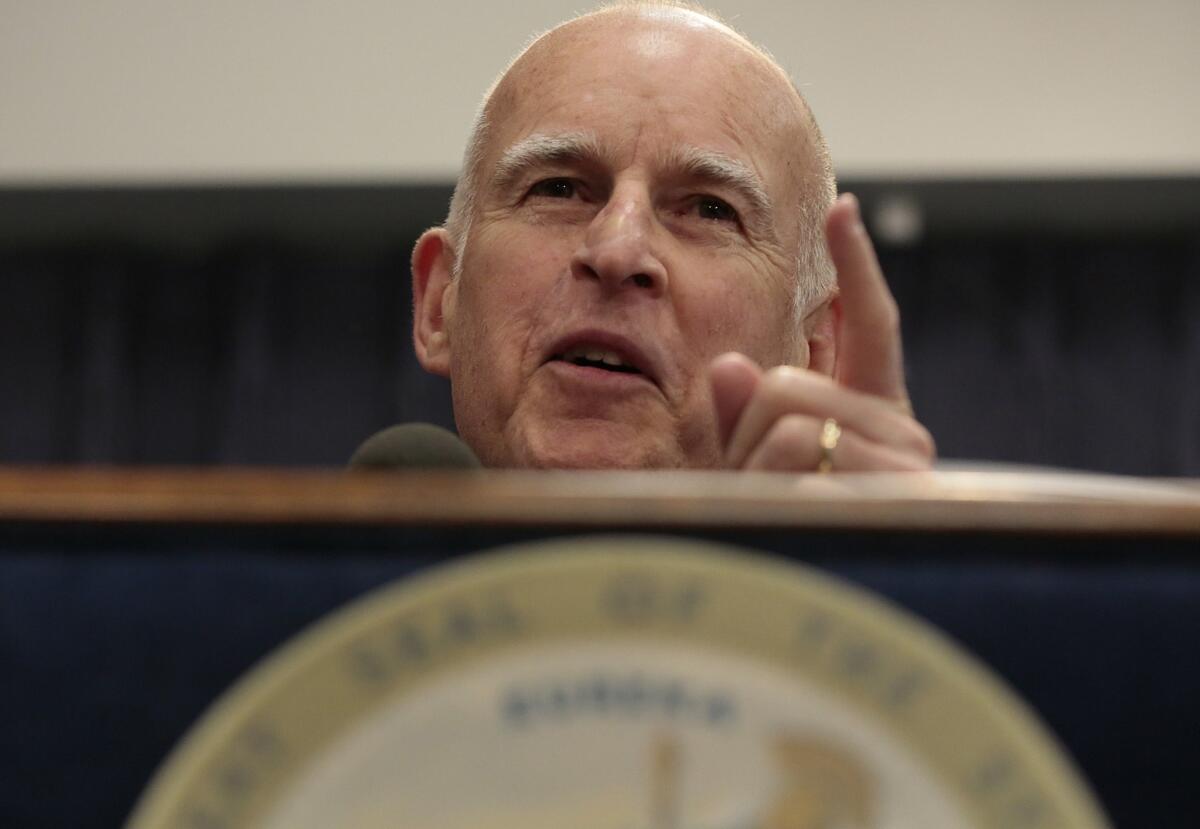Brown budget plan faulted on bullet train, teacher pensions

- Share via
SACRAMENTO — Gov. Jerry Brown’s new budget proposal would continue to improve California’s finances, but his plans for financing bullet train construction and a lack of new money for the cash-strapped teacher pension system are troublesome, the Legislative Analyst’s Office said Monday.
A report from the office, which provides nonpartisan budget advice to lawmakers, said Brown’s $155-billion spending blueprint correctly emphasizes paying down debt incurred during state budget crises.
“The governor’s proposal would place California on an even stronger fiscal footing, continuing California’s budgetary progress,” the assessment said.
And the state could see even more revenue than the administration projects, according to the report. But the extra money may not last, and Brown received praise for proposing a $1.6-billion deposit in the state’s reserve fund as a buffer against future economic turbulence.
“In general, setting aside money for a rainy day is exactly what the state should be doing when revenues are soaring, as they are now,” the report said.
But the analysis said the governor should put more money into the teacher pension fund. Administration officials estimate that the retirement system is underfunded by $80.4 billion.
Brown has proposed only the state’s regular $1.4-billion payment to that system in the next fiscal year, which begins July 1. State officials have said that it would take $4.5 billion a year for the next three decades to stabilize the pension fund.
The governor has said the state needs a new strategy for funding teachers’ pensions, which would involve bigger contributions from the state, schools and teachers themselves. H.D. Palmer, spokesman for Brown’s Department of Finance, said the administration does not expect to have a new funding plan until 2015.
Brown has proposed using $250 million in fees paid by polluting businesses to keep the $68-billion bullet train project rolling while other sources of funding are tied up by legal challenges. The legislative analyst has been wary of such a plan in the past and reiterated its concern in Monday’s report.
The plan is “legally risky,” the report said, because California law requires the state to reduce greenhouse gas emissions by 2020. The bullet train is not scheduled to be completed by then.
The governor, who was visiting Fresno on Monday, told reporters that the pollution fees, collected through California’s cap-and-trade program, is “a very appropriate source of funding.”
“I believe it’s legal,” Brown said. “My lawyers believe it’s lawful.”
Brown said the bullet train was worth the investment because it would reduce greenhouse gas emissions once it’s up and running.
“Yes, it’s long term, but we aren’t all Twitterholics that have to have instant gratification…,” he said. “We can take a few years and build for the future.”
Some lawmakers have been skeptical about the plan. State Senate leader Darrell Steinberg (D-Sacramento) said last week that it would be “one of the central issues in the budget” debate.
He said Brown will have to provide a “credible plan” for continuing construction after the cap-and-trade money is used.
Times staff writer Anthony York in Fresno contributed to this report.
More to Read
Sign up for Essential California
The most important California stories and recommendations in your inbox every morning.
You may occasionally receive promotional content from the Los Angeles Times.














